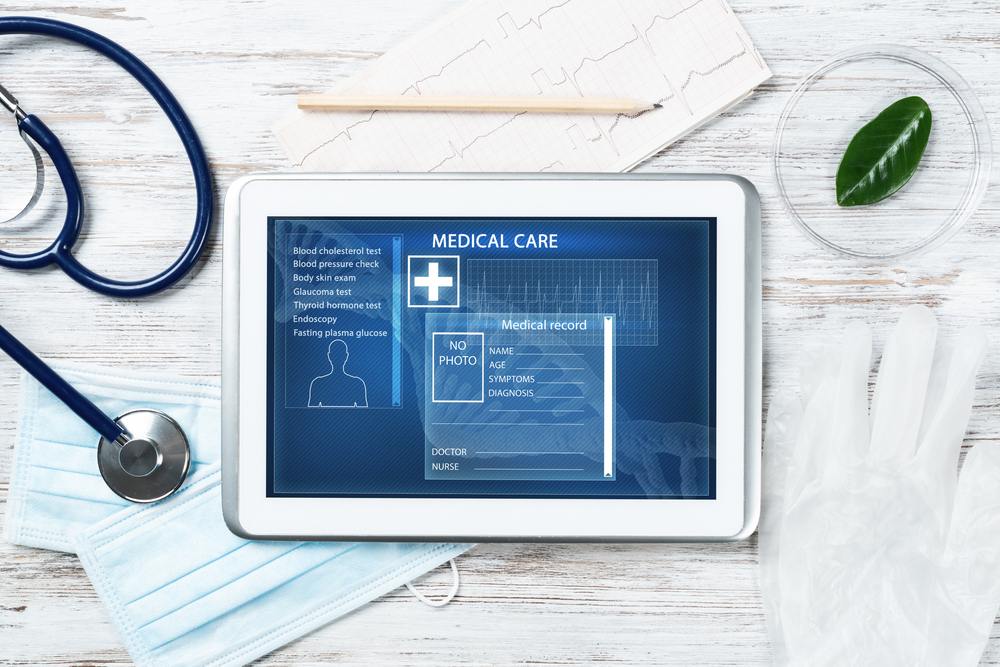In recent years, healthcare app development has become vital to revolutionizing the interaction between patients and healthcare providers. Now, the rise of mobile technology and artificial intelligence is combined to open new avenues for efficient healthcare solutions. To stay updated with healthcare mobile application development, you have to read this guide. Here, you will learn everything related to this emerging trend to streamline healthcare delivery and improve patient outcomes.
An Overview of the Healthcare Market
The healthcare sector comprises businesses that provide medical services and insurance, and manufacture drugs or medical equipment. Notably, this sector is the largest and most complex in the US economy, accounting for 18% of the estimated GDP in 2020. Experts divided healthcare into sub-categories to better understand its varied aspects and overall market.
Among them is the managed healthcare category, which intends to reduce the cost of providing health benefits and improve care quality. According to them, operational costs can be significantly reduced if healthcare IT introduces mobile applications for major health services.
The latest available statistics from 2020 are shown in the table below, which shows popular countries’ per capita healthcare spending. Considering these, one must consider healthcare app development services, which will save time and cost for the people involved.
| Regions | US Dollar/Capita Investment in Healthcare |
|---|---|
| Australia | $4919.2 |
| Russian Federation | $1850.3 |
| United States of America | $10948.5 |
| Canada | $5370.4 |
| South Africa | $1103.5 |
| China | $810.8 |
What is Healthcare App Development?
Healthcare mobile app development means designing an application for mobile devices that deals with health-related affairs. It includes effective management of fitness goals, hospital visits, medical conditions, and insurance claims. Despite them, such apps facilitate lab results review, telemedicine, prescription, and appointment management.
According to some statistics, the global healthcare app development market will generate revenue of over $59 billion by 2025. If you consider the consumer perspective, 71% of patients prefer healthcare apps and see if their doctors are offering in-app services. Additionally, some surveys suggest approximately 52,565 healthcare apps are available on the Play Store, and 51,370 apps are available on the App Store.
Why is Healthcare App Development Essential for Businesses?
Developing a healthcare application will significantly improve patients’ lives by letting them access a wide range of medical facilities within their comfort zone. What’s more, they help streamline hundreds of healthcare management functions and administrative tasks. Let’s have a look at the advantages of custom healthcare app development for businesses:
- Track Employees’ Health: Launching a healthcare app is becoming crucial for employers to track their employees’ physical and mental health. They can set certain fitness goals for their employees and see their daily food intake, exercise, and sleep patterns. This way, they can identify their employees’ struggles with stress or depression to offer support and improve their productivity.
- Help Prevent Legal Issues: Companies need to comply with regulations such as HIPAA and HITECH when it comes to the health of their employees. Using new technologies such as Electronic Health Records (EHR) in healthcare apps can save companies from legal issues. EHR in apps proves a secure way to access the medical data of employees to prevent errors in the workplace.
- Save Medical Time and Cost: Healthcare apps help reduce companies’ medical expenditures by streamlining billing, appointments, and prescriptions. It frees nurses from providing direct patient care and physicians from making notes in each session. According to research, organizations are saving 28% in healthcare spending with the help of app development.
- Instantly Reachable Channel: Mobile applications are instantly reachable channels for businesses and individuals, and they can gain healthcare 24/7. This way, they can increase employees’ experience with the company and save their lives in emergencies.
Benefits of Healthcare Apps for Doctors and Patients
Using healthcare applications, patients can easily track their health status and consult their physicians virtually without commuting. The healthcare application development helps the service provider in monitoring patients and tracking underlying diseases faster. Since the app helps both patients and doctors, let’s study its benefits to get a broader perspective.
Benefits to Doctors
- Less Burnout: Compared with one-on-one direct meetings with patients, healthcare apps seem less stressful to doctors as they liberate them from repetitive tasks. Besides, it makes the process more reliable and helps doctors to focus on healthcare instead of paperwork, leading to no burnout.
- Better Diagnosis: By tracking the remote patient’s progress, doctors can easily analyze and diagnose their condition for effective treatment design. Some apps also contain built-in diagnostic systems that come up with better treatment plans and timely healthcare delivery, reducing doctors’ burden.
- Electronic Health Record: Healthcare apps often include electronic health records (EHRs) to track, store, and collect patients’ data in one forum. This eliminates errors and lets professionals exchange patients’ data across healthcare institutions while referring them for good.
- E-Prescribing: In healthcare apps, E-prescribing is a must-have feature that helps caregivers in adjusting dosages and avoiding potential side effects. Moreover, these platforms minimize errors at pharmacies, which previously occurred due to the fancy handwriting of doctors.
Benefits to Patients
- Accessible Care Anytime: The development of a healthcare mobile app makes on-demand medical services accessible anywhere and anytime. It means faster drug delivery, prescriptions, and emergency first aid when you can’t wait to reach the hospital.
- Better Communication: Medical apps enable patients to maintain real-time communication with health service providers while on their comfort couch. Many times, patients get confused in one-on-one meetings, so these apps help them communicate with doctors over chat.
- High-quality Patient Care: Apart from true medical apps, some fitness and nutrition-related apps aim to maintain health. Smart sensors in mobile devices help patients track their sleep patterns, heart rate, and walking steps for timely interventions.
- Secure Payments: During medical app development, the in-app payment method integrations are highly appreciated by patients. They help patients quickly reach the doctor’s table or in virtual sessions instead of waiting in line, and so on.
Types of Medical Apps
The growing healthcare app development services have created over 95,000 healthcare apps on the App Store and Play Store. They can be divided into healthcare apps, medical apps, patient apps, and professional apps based on their working nature. For now, this section is going to generally highlight medical apps, which directly help experts in delivering care.
1. Chronic Disease Management
Chronic diseases are ailments that require prolonged medications and clinical supervision, such as diabetes, high blood pressure, and heart problems. As they cannot be cured but managed, there are several patient apps for management. Such apps can educate patients, offer expert diets and medications, exercise, and promote good health through improved doctor-patient interaction.
2. Telehealth/Telemedicine Apps
The COVID pandemic has accelerated the adoption of telemedicine, and nearly half of US citizens use telehealth to make up for missed visits. Those apps allow people to see their doctors virtually over smartphones, eliminating in-person visits, which aren’t possible sometimes for patients and the elderly. Besides, telehealth apps allow doctors to see their patients anywhere without managing the office administration of their clinics.
3. Urgent Care Apps
In some emergency circumstances, people aren’t aware of the nearest hospital, which increases stress and lowers decision-making skills. With groundbreaking technologies, there are now urgent healthcare apps that can guide users to the nearest and most cost-effective emergency rooms. Moreover, they can highlight travel time, waiting period, insurance options, and directions to the urgent care spot.
4. Medical Education Apps
To effectively cope with stress and other issues, one must know the meaning of these terms. That’s why several healthcare mobile app developments focus on people with up-to-date medical information. Also, these apps aim to educate students, doctors, and medical users with innovative medical research through a reliable database.
5. Remote Patient Monitoring
Remote Patient Monitoring, or RPM, refers to patient health tracking outside of the clinical environment, which enables doctors to observe patients at any time. Additionally, these apps simplify collecting a patient’s medical data to streamline diagnosis, prescriptions, appointments, and medical examinations. In this context, some apps let physicians pick the right drug for each patient, cancel prescriptions, and control dosage.
6. Mental Health Apps (For Patients)
Another important type of app involves mental health apps, which make therapy accessible for all. Numerous studies by neuroscientists suggest meditation has a positive impact on mental health. Therefore, mindfulness apps are being developed to connect experienced professionals with people in their homes, parks, and hotel rooms.
Top 5 Popular Healthcare Apps
As briefly mentioned above, countless applications for medical services are available on the App Store and Play Store. However, not all are reliable, updated, and effective, so we have done in-depth research and listed some of the leading ones. You can review them and pick any healthcare app development company that is best available in your region and aligns with your needs.
1. CentralWell PrimaryCareAnywhere (Android | iOS)
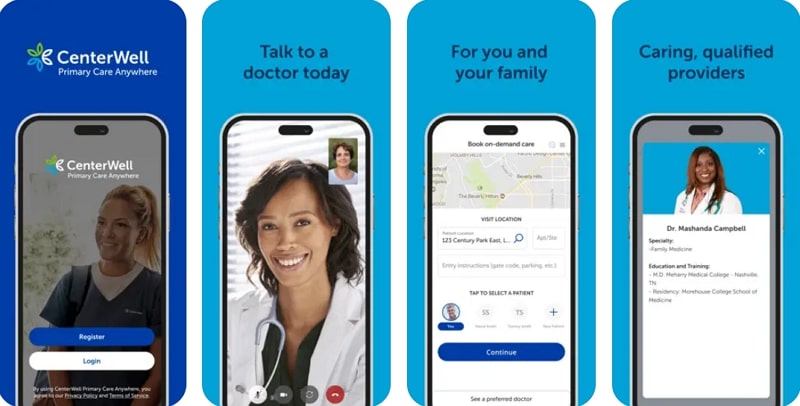
This application, formerly known as Heal, aims to provide in-home primary healthcare for better patient outcomes. It is a licensed app with qualified doctors and Omni model care that facilitates virtual telemedicine visits and doctor house calls. In addition, this app has a secure infrastructure that requires patients to create an account to proceed securely and avail themselves of a personalized experience.
Key Features
- Through its doctor house call, users can call and invite doctors to their convenient living room.
- Users can select a primary care provider and visit the same nurse or practitioner repeatedly.
- This app lets you discuss your health concerns with doctors over video chat or audio calling.
2. Talkspace Therapy and Support (Android | iOS)
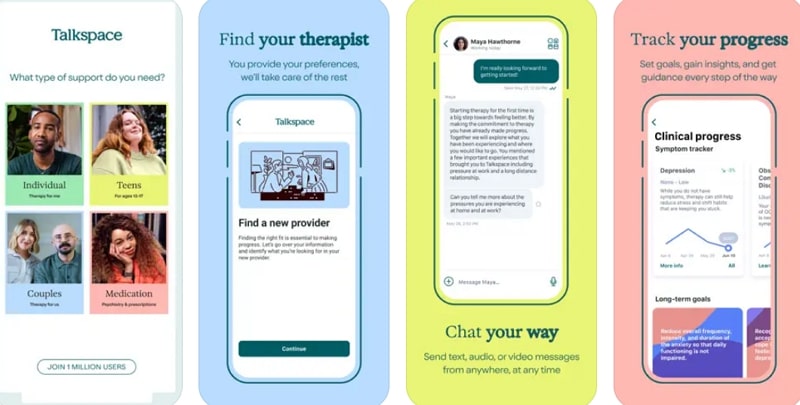
If you need a focused mental health app, this one is the most affordable and convenient option with licensed therapists. This healthcare app development service provides high-quality mental health care to anyone above 13 years of age. In one study, 81% of Talkspace application users reported that they felt significant improvements in in-person therapy.
Key Features
- It lets users send unlimited texts to their therapists and share images, audio, and video messages over the app.
- This app is also equipped with banking-grade encryption to protect your data in compliance with HIPAA.
- Statistics reveal that this app has thousands of licensed therapists who have helped individuals with anxiety and depression symptoms within two months.
3. Doctor On Demand (Android | iOS)
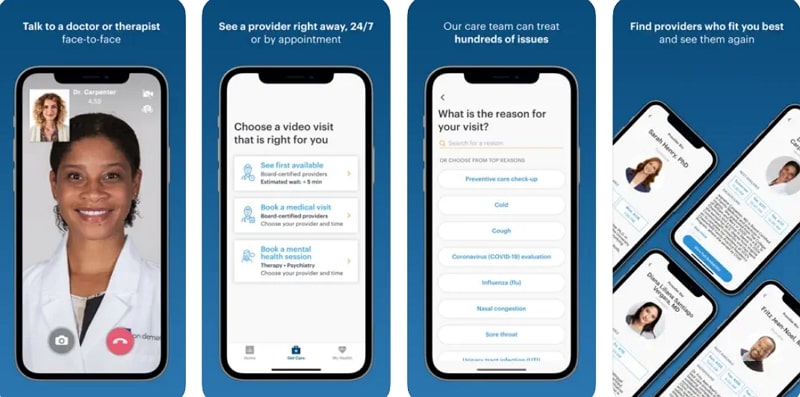
It’s a well-known app that makes video doctor visits possible anytime over your smartphone. You can contact your medical specialists, psychiatrists, psychologists, or general physicians with or without insurance at lower rates. Notably, it deals with colds, acne, stress, allergies, prescription refills, urinary tract infections, migraines, and screenings for diabetes.
Key Features
- It provides healthcare services even on holidays and weekends and allows you to choose immediate calling sessions or scheduled visits.
- This app treats you in the privacy of your home and lets you talk to your therapist over video calls.
- Compared with traditional healthcare modes, appointments are available faster, and prescriptions can be sent to your chosen pharmacy.
4. PocketRx – Refill Medications (Android | iOS)
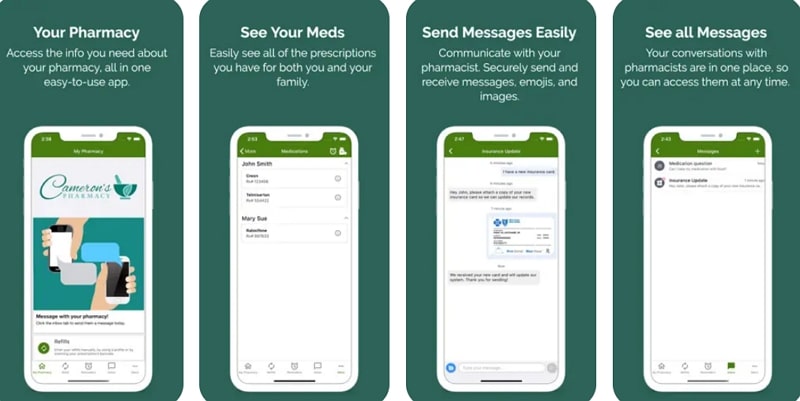
In today’s business, it’s common to forget to take pills, so this app is designed to manage your medications. This healthcare app development company provides up-to-date medical news on your condition and connects you with the local pharmacy community. Here, users can see pharmacy hours and locations and chat with family and pharmacists all in one place.
Key Features
- Users can get their prescription refills anytime within 30 seconds, and there are flexible reminders to avoid medication skipping.
- It provides you with detailed information about your medications, including their side effects, ratings, and availability.
- Through this app, you can communicate with your pharmacist with text messages, emojis, and image sharing.
5. Direct Health for Doctors (Android | iOS)
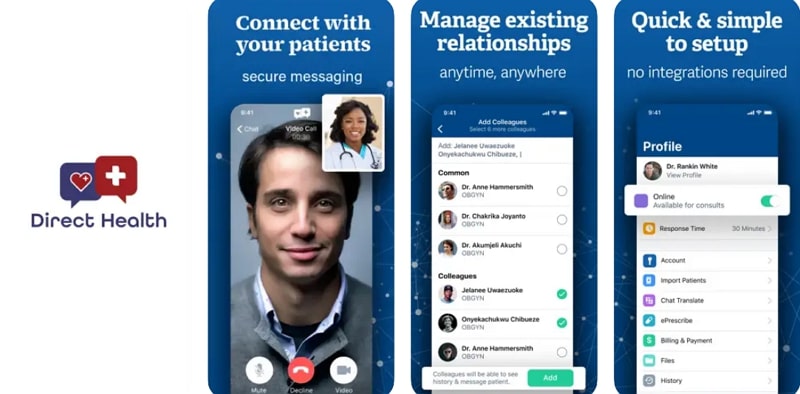
Doctors rely on this application to communicate with patients outside the office and maintain all critical client-patient relationships. The Direct Health for Doctors app is directly compliant with HIPAA and is an effective service for patients and doctors. They can communicate via text, voice call, and video conferencing flexibly and safely anytime.
Key Features
- This app offers thousands of doctors, including general physicians, psychiatrists, surgeons, psychologists, dermatologists, and dentists.
- Here, doctors can set their own consultation rates and even chat with their colleagues for immediate case discussions.
- It allows doctors to initiate group calling sessions with up to 10 patients or colleagues and track their earnings through the dashboard.
Must-Have Features in a Healthcare Application
According to McKinsey, healthcare professionals use applications for consultations with patients 50-175 times more than in the pre-pandemic era. Considering this, healthcare mobile app development revolutionizes and introduces valuable features. Let’s explore some essential features of a healthcare application without which the process cannot be smooth and efficient.
- Appointment Management: As the name suggests, this feature makes it easy to book consultations with doctors based on their profiles. It lets doctors see their calendars and view upcoming appointments to accept or decline according to their availability.
- Communication Functions: Secondly, a must-have feature of a healthcare app is its communicative abilities that connect patients and doctors. In this regard, they should have an in-app chat, audio calling, video conferencing to show symptoms, and live-streaming for healthcare seminars.
- Wearable Integration: From Apple’s smartwatch to Samsung’s, wearable devices have risen in popularity in recent years. Thus, the apps should integrate connectivity with these wearable devices to check blood pressure, heart rate, and so on.
- Prescription Tracking: An e-prescription feature must be added to a healthcare app so patients can schedule their dosage effectively. Besides, it will save them from misinterpreting doctors’ handwriting and facilitate checking medicines’ availability at nearby pharmacies.
- Reminders and Notifications: The healthcare app must have a reminder feature for doctors and patients to minimize missed appointments. Additionally, receiving daily meditation or pill reminders can help improve overall health outcomes.
How to Monetize a Healthcare Application
Deciding on an optimized monetization model is crucial for custom healthcare app development, which must simultaneously meet business objectives and patients’ needs. Therefore, below are some commonly adopted monetization models you can look into before app development as they impact the revenue model.
- In-app Purchase: This model is relatively difficult to implement, but it is proving to be the most profitable one in the healthcare sector. To work best, your app can offer patients the option to buy meds or nutrition supplements with a charging fee per purchase.
- Subscription Models: Healthcare apps can charge professionals a subscription fee to register and offer services. Doctors who wish to be featured on the app can pay monthly, quarterly, or yearly.
- Advertising Campaigns: This is the easiest model to implement and a quick way to earn money from healthcare app development. In-app advertising offers pay-per-click or pay-per-view models, but the ads must promote the most relevant products and services.
- Health Insurance: Instead of seeking service seekers or providers, you can contact health insurance companies that promise health to their employees or clients. This model generates more revenue than other models as the app caters to company employees and receives hefty amounts from them.
- Sponsorship: To meet budget requirements, app owners can grab different sponsors, such as medical shops and pharmacies. What apps need is to promote their brand names on online platforms and offer discounts or services to users.
How to Develop a Healthcare App
Now that you have learned about the benefits of healthcare application development and its must-have features. You must remember that developing an app from scratch involves crucial steps because it must function as intended. Thus, let us simplify the process through a step-by-step guide next so your developed app can comply with healthcare standards easily.
Step 1: Market Requirement Analysis
Before starting the coding, decide on your targeted audience and conduct in-depth market research. While researching, you must identify your competitors, current trends, technologies, and opportunities. Moreover, you can assess medical regulations and the app’s interoperability with the current healthcare system.
Step 2: Select the Application Type/Category
The second step is to determine the type of healthcare app and your app goals. This will involve identifying what kind of app you need, how it will work, and what pain it will solve. Some famous types of apps involve telemedicine, fitness, nutrition, meditation, and health monitoring apps. However, you should consider your competitors and develop a unique idea for a successful application.
Step 3: Begin By Developing a UI/UX Design
Once all the necessary groundwork is finished, create intuitive and user-friendly interface designs for the healthcare app. In this regard, you must incorporate brand colors and establish a clear visual identity for the application. Additionally, you are advised to prioritize simplicity and user-centered design to reduce the cognitive load of your app and users.
Step 4: Start Frontend and Backend Development
Here comes the main aspect of the custom healthcare app development process, where you must develop the backend with frameworks. To do so, you can try Node.js or Django platforms, which should focus on data security and compliance. In addition, build an easy-to-navigate frontend with frameworks like React Native and Vue.js.
Step 5: Integrate APIs and Develop an MVP
When developing a healthcare app, you can easily integrate APIs such as ZEGOCLOUD for real-time communication features. You can also look for payment processing and electronic health records APIs because they can bring features to the app without effort. Now, consider the fundamental MVP creation rules to enter the market faster and gather real-time feedback.
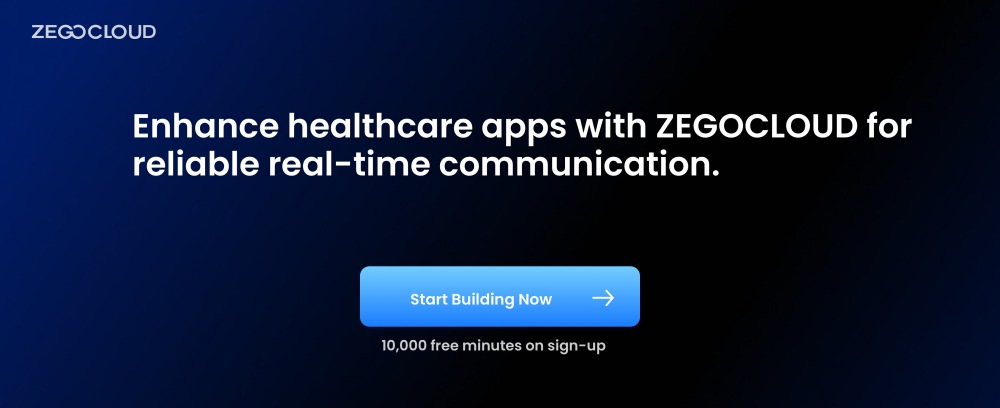
Step 6: Make it Secure, Monitor, and Improve
Finally, security and privacy can be ensured by implementing robust security practices with secure authentication and strong data encryption. Then, test the app, track its performance to fix bugs, and check if it meets your expectations. Even after launching the app on the App Store or the Play Store, collect users’ feedback and improve features for the good.
Healthcare App Development Best Practices
Unfortunately, the healthcare software development process is complex and challenging, involving hundreds of sub-processes. If you want to prevent time, money, and effort loss, you can count on the following best practices in healthcare application development.
1. Selection of Feature Set
The success of an app relies on the features included in it, and the type of features heavily depends on the type of app. Thus, carefully select the app’s features and expand your limits from scheduling appointments to in-app payments and wearable integration features.
2. Solid Data Security
Pay close attention to data protection in your app while giving users’ medical data to doctors. Besides, online app payments for appointments should have a solid security system to protect sensitive data. In this regard, an app is considered good if it has data encryption, MFA protection, and an expiration policy.
3. Comply with Guidelines
Alongside security, healthcare apps must adhere to the legal protocols provided by HIPAA, HIMSS, and FDC. Before developing an app, it is essential to read each guideline carefully to avoid legal issues after launching it.
4. Purpose Focused
As you know, the healthcare app covers various sub-categories, so it is advised to keep your business focused on one. By addressing a single pain point, companies can deliver profound value to stakeholders. Thus, the best practice is to keep the focus on one category single-handedly and not run behind by offering multiple things.
5. Working Monetization Model
Digital products are designed to generate revenue, so the best practices in the healthcare app sector are having an operating monetization model. Furthermore, you should plan the launch using multiple hardware choices instead of sticking to one operating system.
How Much Does It Cost to Develop a Healthcare App?
The cost of healthcare mobile application development depends on the type of product and the features you wish to add. However, the average cost of developing a healthcare app falls between $100,000 to $500,000 range. This cost will involve front-end developers, UI/UX experts, quality assurance teams, business analysts, back-end developers, data compliance with HIPAA, etc.
In other words, the cumulative cost to develop a healthcare app depends on complexity, features, and customizations. Roughly, quality assurance may take at least $4500, and project management will cost $5500 and $40000 for developing the application. Moreover, different types of app development will cost differently, as you can see in the table below for clarity.
| Healthcare Application Type | Approximate Cost in USD |
|---|---|
| Medical Networking | $30,000 – $60,000 |
| Billing App | $40,000 – $90,000 |
| e-Prescription App | $40,000 – $80,000 |
| Wellness App | $60,000 – $160,000 |
| Nutrition Planner | $30,000 – $60,000 |
| Telemedicine app | $50,000 – $200,000 |
| Healthcare Monitoring | $50,000 – $100,000 |
| Fitness App | $25,000 – $200,000 |
| Chronic Disease Management | $100,000 – $5400,000 |
| HER/EMR Systems | $200,000 – $1,000,000+ |
| Appointment Scheduling | $50,000 – $150,000 |
| Medical Reference App | $60,000 – $150,000 |
Trends in Mobile Health App Development
Staying ahead of trends is crucial for developers and entrepreneurs to the success of the app. It is because they are investing a hefty amount, and the landscape of healthcare app development services continues to evolve. Anyhow, the following are some trends shaping the future of health apps, which you must see to achieve the top spot in the market.
- Blockchain Technology: A leading trend in healthcare apps is blockchain technology, which focuses on robust security features and higher data encryption levels. According to statistics, applications with blockchain will hit USD 4.46 million in 2026 at a CAGR of 3.815 during 2022-2026.
- AI and Machine Learning (ML): It’s another dominant trend in the medical space that can suggest immediate medical treatments in the absence of professionals. Also, integrating AI and ML can convey detailed medical insights to doctors and prescribe essential medications.
- Internet of Things (IoT): According to an official report, adopting IoT solutions in healthcare will reach USD 253.7 billion by 2026. Healthcare apps linked to IoT can provide comprehensive healthcare and facilitate remote access to valuable patient information.
- Integration of Wearable Devices: Doctors dealing with chronic diseases and mobility issues heavily rely on wearable devices integrated with apps. These devices help them measure heart rate, sleep activity, and blood pressure remotely for better health management.
- Cloud Computing and AR/VR: These technologies safely store patient data on the cloud, provide adequate infrastructure, and enhance remote patient monitoring. Plus, AR technology is also trending to provide guided meditations and mindfulness exercises to people with mental ailments.
Empowering Healthcare App Development with ZEGOCLOUD’s Real-Time Communication Solutions
If you have already planned your custom healthcare app development like Teladoc, let us accelerate the process. To do so, you are suggested to use ZEGOCLOUD APIs and SDKs that offer communication features for your healthcare app. For developers, this can craft an interactive UI based on your brand identity with a fully customizable experience.
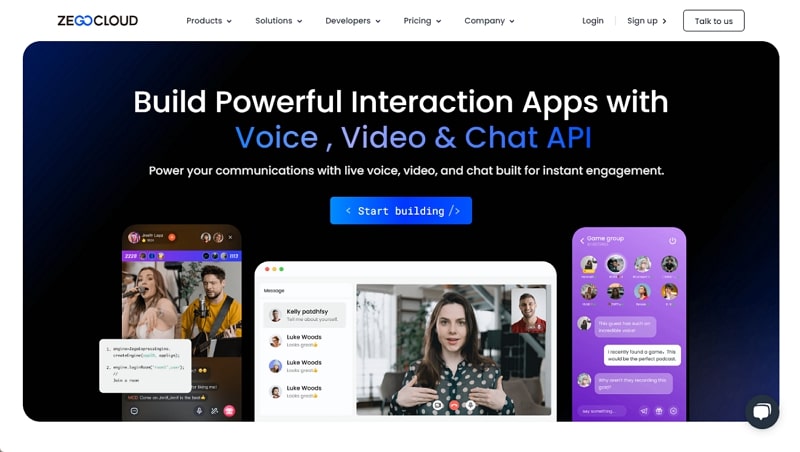
Most importantly, it has an easy-to-embed video-calling API that will deliver 4K resolution video to patients and doctors using the app. They can even utilize group video calling for group therapy sessions with session recording and virtual background features. Moreover, there is an in-app chat SDK that will provide push notifications, media attachments, group chats, and read receipts features.
ZEGOCLOUD also provides live streaming and audio calling SDKs with countless features so healthcare providers can communicate flexibly. Notably, apps with ZEGOCLOUD APIs and SDKs will provide smooth video and voice experience with ultra-low latency and high network resilience.
Conclusion
This article has highlighted every aspect of healthcare mobile application development. Here, you have found the benefits of such an app to doctors and patients with their types and developing costs.
Some must-have features, current trends, and popular apps were also discussed in this guide to help you create your own. Ultimately, it was found that ZEGOCLOUD APIs and SDKs are fruitful in adding communication features to the healthcare app within no time.
Read more:
FAQ
Q1: How to develop an app for healthcare?
First, define the app’s purpose and features clearly, such as telemedicine, health tracking, etc. Then conduct market research and design the user interface. After that, choose the right technology stack and start the development process, which includes backend and frontend development, database setup, and integration of necessary APIs. Finally, perform thorough testing and ensure compliance with relevant regulations before launching and providing post-launch support.
Q2: Do healthcare apps require FDA approval?
It depends. If the app is considered a medical device, such as those that diagnose, treat, or monitor medical conditions, it usually requires FDA approval. However, apps that are mainly for general health and fitness tracking or providing educational information may not need FDA approval.
Q3: How long does it take to develop a healthcare app?
A basic app may take 3 – 6 months to develop. A more complex and feature-rich app could take 9 months to over a year. The time is affected by factors like the complexity of features, development resources available, and the need for regulatory compliance and testing.
Let’s Build APP Together
Start building with real-time video, voice & chat SDK for apps today!









